Implacable, immutable, irreplaceable: why Malcolm Young was a rock’n’roll great

‘Not only is he a great guitarist and songwriter, but also a person with vision – he is the planner in AC/DC. He is also the quiet one, deep and intensely aware.” That’s how Malcolm Young was described in an early Atlantic Records press release about the band he founded and led for more than 40 years, those words ringing true right until dementia forced him to retire from the band in 2014. Now, just weeks after the passing of his elder brother George – a rock hero in his own right, and an important part of the AC/DC story, too – he has died, aged just 64.
The presence of George – a star in the 1960s with the Easybeats – meant rock’n’roll was not an unattainable dream in the Young household in Sydney. And so Malcolm pursued it, forming AC/DC in 1973.
Greatness wasn’t immediate, but it came. The first three Australian AC/DC albums were patchy, and whittled down to two much better records for international release. Let There Be Rock, from 1977, was a huge step in the right direction, and the following three years saw AC/DC release three of the greatest hard rock records ever – Powerage (1978), Highway to Hell (1979) and Back in Black (1980). They never reached those heights again, but every single AC/DC album thereafter – nine of them – contained at least one song, often more, that slotted as comfortably into the setlist as anything from the older, greater albums.

And Malcolm Young was the heart of it all. The great producer and engineer Terry Manning – whose career consisted largely of working with the greatest soul groups and rock bands – once said that as a rhythm guitarist, Malcolm was the equal of Steve Cropper, of Booker T & the MG’s, and that does not oversell him.
Malcolm, on a Gretsch Jet Firebird that always looked giant on his tiny frame, was not just the business brain of AC/DC but their musical heart, too – everything AC/DC did stemmed from his playing. And what he played, he insisted, was rock’n’roll, not rock. One puzzled interviewer once asked him the difference between the two. “Well, rock bands don’t really swing,” he said, as if explaining how the Earth was in fact spherical rather than flat. “Rock’n’roll has the swing.” He proceeded to demonstrate precisely what he meant by hissing out the respective hi-hat patterns, while beating his thigh to mime the kick drum. “They don’t understand the feel, the movement.”
You can hear that feel best, perhaps, on the version of Live Wire that opened the 1977 promo album Live From the Atlantic Studios, a performance so taut and dynamic it ought to be mandatory listening for every aspiring rock band.
Crucial to it all is space: no matter how raw Malcolm’s rhythm playing is, he never gives in to the temptation to fill in the gaps. Power chords are allowed to fade, not be chopped off prematurely.
That’s also a tribute to Malcolm’s songwriting. Think of it: his name appears on the credits of so many classics: Dirty Deeds Done Dirt Cheap, Let There Be Rock, Whole Lotta Rosie, Highway to Hell, Back In Black, You Shook Me All Night Long, For Those About to Rock (We Salute You), and countless more almost as well known.
That combination of songwriting and playing made AC/DC something unique. Even in the 1970s, it was hard to juggle rock’n’roll’s constituent parts to come up with something that sounded like no one else. By Powerage, when they shed the blues shuffle once and for all, AC/DC had managed that. From then on, anyone trying to incorporate AC/DC’s influence just ended up sounding like copyists, without the same finesse – try the Cult’s Electric album, or anything by Airbourne and you’ll see what I mean.
That’s because AC/DC’s greatest songs aren’t just riffs and choruses, they’re full of tricks and variations: the pauses after three crashing chords of each part of Highway to Hell’s riff, the stutter in Back in Black, the way Riff Raff spends 30 seconds building up to its monstrous central riff, then a further minute allowing the whole riff cycle to unspool before allowing the vocals to come in.
For people who simply refuse to countenance the idea that a band who spent almost all their career playing riffs with largely puerile lyrics on top could be revolutionary, the following statement will sound ridiculous, but I believe it to be true: Malcolm Young was hard rock’s Ralf Hütter, someone who saw the possibilities of focusing on one thing and pursuing it to its end. He was implacable, immutable, irreplaceable. He was one of the greatest rock’n’roll musicians ever.

 Yahoo News
Yahoo News 